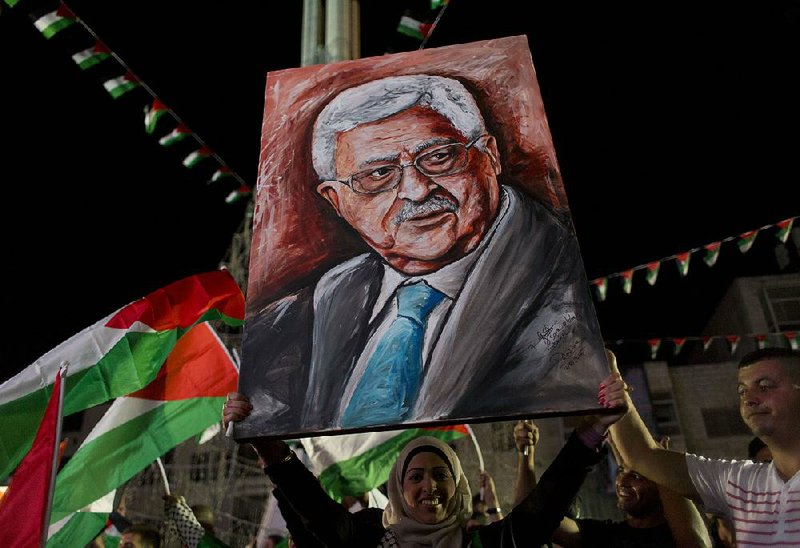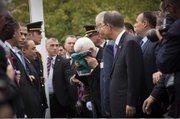UNITED NATIONS -- Palestinian President Mahmoud Abbas declared before world leaders Wednesday that he is no longer bound by agreements signed with Israel and called on the United Nations to provide international protection for Palestinians.
After issuing his most serious warning yet that he might walk away from engagement with the Jewish state, Abbas stopped short of accompanying his threat with a deadline or giving any specifics, leaving room for diplomatic maneuvers to refocus the world's attention on the Israeli-Palestinian conflict.
Abbas did not say how he will move forward. He also avoided mentioning a mainstay of Israeli-Palestinian relations -- security coordination between his security forces and Israeli forces in the West Bank against a shared enemy, the Islamic militant group Hamas.
The Israeli-Palestinian pacts outline security, economic and other arrangements in the Palestinian territories occupied by Israel during and after the 1967 war.
Israeli Prime Minister Benjamin Netanyahu was quick to denounce Abbas' speech.
In a statement issued by his office, Netanyahu said the speech was "deceitful and encourages incitement and unrest in the Middle East."
Netanyahu called on Abbas to "act responsibly" and answer his proposal for direct negotiations with Israel without any preconditions.
"The fact that time after time he [Abbas] does not respond is the best proof that he has no intention of reaching a peace agreement," the statement said.
Abbas' comments came after years of stalled attempts to negotiate with Israel a Palestinian statehood and several months after Netanyahu formed a right-wing government that has continued settlement expansion on lands the Palestinians want for their state.
On Wednesday, Abbas said Israel's refusal to commit to the Oslo Peace Accords and subsequent agreements "renders us an authority without real powers."
"As long as Israel refuses to cease settlement activities and to the release of the fourth group of Palestinian prisoners in accordance with our agreements, they leave us no choice but to insist that we will not remain the only ones committed to the implementation of these agreements, while Israel continuously violates them," Abbas said.
"We therefore declare that we cannot continue to be bound by these agreements and that Israel must assume all of its responsibilities as an occupying power," he declared. He did not elaborate on which agreements.
Abbas also accused Israel of "repeated, systematic incursions upon Al-Aqsa Mosque aimed at imposing a new reality," warning that such actions create an explosive situation. The site in Jerusalem's Old City, sacred to Jews and Muslims, has experienced repeated clashes over the past two weeks.
"It is no longer useful to waste time in negotiations for the sake of negotiations; what is required is to mobilize international efforts to oversee an end to the occupation in line with the resolutions of international legitimacy," he said. "Until then, I call upon the United Nations to provide international protection for the Palestinian people in accordance with international humanitarian law."
Later Wednesday, Abbas raised the flag of Palestine at the United Nations for the first time, with a promise that it will be raised soon in Jerusalem, "the capital of our Palestinian state."
"In this historical moment I say to my people everywhere: Raise the flag of Palestinians very high because it is the symbol of our identity," Abbas said.
Among the 300 or so people watching were the foreign ministers of Russia, France and Saudi Arabia, the prime minister of Turkey and U.N. Secretary-General Ban Ki-moon, who urged a return to peace talks between the Israelis and the Palestinians.
"We can be under no illusion that this ceremony represents the end goal," Ban said.
The Palestinians campaigned for a General Assembly resolution, overwhelmingly approved Sept. 10, that allows U.N. observer states to fly their flags alongside those of the 193 U.N. member states. The Holy See and the Palestinians are the only two U.N. observer states.
The Palestinians have used that status to attain voting rights in other U.N. agencies and to join the International Criminal Court, where they have threatened to seek war-crimes prosecutions against Israel as the occupying power on Palestinian lands.
In an online essay published Tuesday in The Huffington Post, the Palestinian president said a new multilateral approach to the Israeli-Palestinian conflict is needed since direct negotiations with Israel have failed repeatedly.
"While the Israeli government pays lip service to the two-state solution internationally, domestically it employs policies aimed at destroying what's left of Palestine," he wrote.
Abbas said the model should be based instead on the type of negotiations that took place in the Balkans, Libya and Iran.
"The peace process must be multilateral. The same pattern of negotiations imposed for years will not work because Israel is the occupying power," he wrote in the essay.
While Abbas' Palestinian Authority rules over most of the West Bank Palestinian population, Israel still controls much of the territory.
Cheers, skepticism
In Ramallah, the Palestinian Authority headquarters in the West Bank, several thousand people gathered in a square to watch a broadcast of Abbas' speech, wildly cheering as he announced that his government no longer considered itself bound to agreements with Israel.
A few dozen youths waved Palestinian flags in the square, named after Yasser Arafat, the Palestinian leader who signed the first of the Oslo accords in 1993.
Some Palestinians, however, said they believed that little would change after Abbas' speech, or the raising of the national flag at the United Nations.
"It was expected that the president would say he isn't going to abide by the agreements," said Mohammad Jamil, a 23-year-old librarian, who watched the speech in a Ramallah cafe.
"We've reached a blocked path with Israel," Jamil said. "But I doubt this will be a solution."
The practical effects of Abbas' speech were not immediately clear.
Khalil Shikaki, a leading Palestinian political analyst, said Abbas' declaration was "a big deal, no doubt" but would mean "absolutely nothing" on the ground "until he starts taking the steps he mentioned" to curtail security, economic, and civil coordination between Israel and the Palestinian Authority. He said Abbas would be under tremendous pressure from Palestinians to cut these ties but would probably take weeks or months to follow through, if at all.
Others expressed skepticism that Abbas' announcement would change anything.
Palestinian analyst Hani al-Masri in Ramallah said Abbas is trying to attract attention and pressure Israel.
"This is a threat, not a plan," he said. "Abbas has no plan, otherwise he could have spelled it out in his speech and could have told the world he is going to do this and that and asked them for understanding and support."
Nathan Thrall, a Jerusalem-based analyst for the International Crisis Group, said that what sounded like a bold declaration was actually "a years-old talking point." He called it "old, old, old, old news."
"That is the minimum he could have said," Thrall said. "They've been saying it for weeks and years: We fulfill our obligations and they don't fulfill theirs, and we're not bound by it if they don't fulfill theirs and the whole thing."
Aaron David Miller, a Middle East expert and scholar at the Woodrow Wilson Institute in Washington, said Abbas' speech was "an expression of frustration and an effort to create a new point of political departure for his international drive for recognition."
Information for this article was contributed by Zeina Karam, Karin Laub, Mohammed Daraghmeh, Ian Deitch and Edith M. Lederer of The Associated Press and by Rick Gladstone, Jodi Rudoren, Diaa Hadid and Somini Sengupta of The New York Times.
A Section on 10/01/2015



